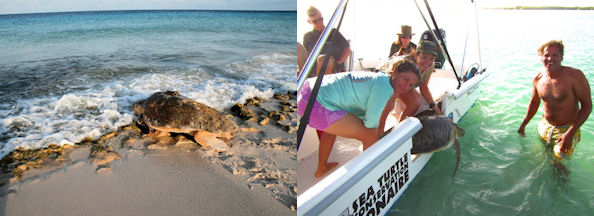Dutch Caribbean turtles migrate through risky waters
Sea turtles who breed in Bonaire, Caribbean Netherlands, migrate great distances of up to 3,500 km to reach their foraging grounds across the Caribbean in 10 different countries . This is shown by researchers examining the migratory behaviour of 24 turtles during 10 years using satellite tracking. The turtles’ journey is risky, because they cross waters of countries where sea turtle harvest is legal or where they could end up as unwanted by catch.
Lisa Becking (Wageningen University and IMARES) and Marjolijn Christianen (University of Groningen and IMARES) together with Mabel Nava and her team at Sea Turtle Conservation Bonaire, recently published on their study in the Endangered Species Research Journal (ESR).
The study also identifies 2 important foraging grounds for sea turtles breeding at Bonaire, in Venezuela and in shallow banks off the East coast of Nicaragua and Honduras.
Migrating to native beach
Sea turtles are long-lived migratory reptiles with a complex life cycle. Mature sea turtles breed in the vicinity of the beach where they were born (called a rookery). Thus, at the onset of the reproductive season, adults migrate from their resident foraging area to their natal rookery region to breed; for long distances if necessary.
Through risky waters
The sea turtles nesting at Bonaire – a key tourist attraction - are at risk of harvest in the waters they frequent. Given the wide dispersal, these turtles are at risk of legal or illegal harvest, which impacts conservation efforts and threatens turtle populations far removed from those territories. The breeding turtles from Bonaire face particular threats in the countries of Nicaragua, Panama, Venezuela, Colombia and Haiti.
Satellite tracking
The island Bonaire is home to small nesting beaches of three sea turtle species. To elucidate the geographic scope of the populations of sea turtles breeding at Bonaire and Klein Bonaire (Caribbean Netherlands) the research team examined the post-breeding migratory behaviour of 5 female loggerheads
Caretta caretta
, 4 female green turtles
Chelonia
mydas
, and 2 male and 13 female hawksbill turtles
Eretmochelys imbricata
during the years 2003−2013 using satellite tracking.

Knowledge is effective conservation
For small rookeries, such as those utilizing the islands of the Caribbean Netherlands, knowledge of turtle migratory behaviour remains scarce. Knowledge of such linkages is valuable for conservation efforts, as foraging aggregations are not homogeneously distributed across the Caribbean Sea and migration routes can vary among individuals of the same nesting colony. Understanding turtle spatial ecology and identifying critical foraging habitats and movements is integral to effective sea turtle conservation.
Dr. L. E. Becking (Marine Animal Ecology Wageningen University), Dr. M.J.A. Christianen (Marine Evolution and Conservation group, University of Groningen ) – in part financed by NWO Caribbean Programme grant “Ecology and Conservation of Green and Hawksbill Turtles in the Dutch Caribbean” (dossier no 858.14.092, PI prof. dr. P.J. Palsbøll, Marine Evolution and Conservation group, Groningen Institute for Evolutionary Life Sciences , University of Groningen, the Netherlands.
| Last modified: | 07 August 2020 11.46 a.m. |
More news
-
07 April 2025
Plastic recycling: how to best reuse carbon atoms
Scientists at the University of Groningen are working on new ways to recycle plastic waste into new, high-quality products.
-
07 April 2025
Gratama Jubilee gift for Marleen Kamperman and Marijke Leliveld
Prof. Marleen Kamperman and Marijke Leliveld received EUR 100,000 from the Gratama Foundation for their research project aimed at producing organic textiles for sustainable fashion.
-
03 April 2025
IMChip and MimeCure in top 10 of the national Academic Startup Competition
Prof. Tamalika Banerjee’s startup IMChip and Prof. Erik Frijlink and Dr. Luke van der Koog’s startup MimeCure have made it into the top 10 of the national Academic Startup Competition.
